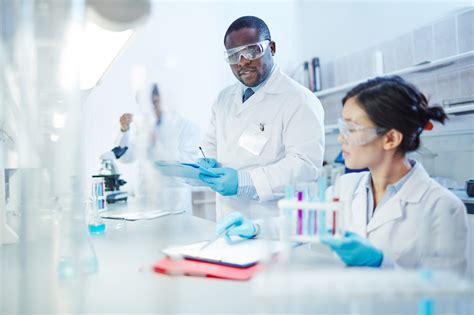Are you interested in a career that combines your love for science with a passion for making a difference in healthcare? If so, a career as a pharmaceutical scientist might be the perfect fit for you. In this blog post, we will explore the role of pharmaceutical scientists and the educational and practical experience requirements needed to succeed in this field. We will also take a closer look at the specialized areas within pharmaceutical science and the importance of preclinical and clinical trials in drug development. Additionally, we will delve into the use of advanced technologies in pharmaceutical research, the regulatory guidelines and drug approval process, and the collaborative nature of working with other healthcare professionals. Join us as we uncover the fascinating world of pharmaceutical science and the vital role it plays in advancing medicine and patient care.
Table of Contents
Understanding the Role of Pharmaceutical Scientists
Pharmaceutical scientists play a crucial role in the development, production, and testing of medications. They are responsible for ensuring that drugs are safe, effective, and of high quality. Their work involves researching, formulating, and testing new drugs, as well as improving existing ones. Through their work, pharmaceutical scientists contribute to advancing medicine and patient care.
Education and training requirements for pharmaceutical scientists vary depending on the specific role and area of specialization. A minimum of a bachelor’s degree in pharmaceutical sciences or a related field is typically required, with many roles also requiring advanced degrees such as a master’s or Ph.D. Practical experience is also essential, with many pharmaceutical scientists gaining hands-on experience through internships and cooperative education programs.
Pharmaceutical scientists can specialize in various areas within the field, such as pharmacokinetics, drug formulation, or regulatory affairs. Specialization allows them to focus on specific areas of drug development and research, contributing to the overall success of pharmaceutical projects. These specializations also provide opportunities for advancement and career growth within the field.
Overall, pharmaceutical scientists play a critical role in drug development and safety, and their work is essential in improving the quality of healthcare and advancing medical research.
Education and Training Requirements for Pharmaceutical Scientists
Pharmaceutical scientists play a critical role in the development and testing of medications that improve and save lives. To pursue a career in this field, individuals must meet specific education and training requirements.
Prospective pharmaceutical scientists typically need a strong foundation in the sciences, including coursework in chemistry, biology, and physiology. Many pharmaceutical scientist positions require at least a bachelor’s degree in pharmaceutical sciences, chemistry, biology, or a related field. Some positions, particularly those in research and development, may require a master’s or doctoral degree.
In addition to formal education, aspiring pharmaceutical scientists can benefit from gaining practical experience through internships or co-op programs. These opportunities provide hands-on experience in a laboratory setting and allow individuals to apply their knowledge to real-world drug development and testing.
Continuing education is also essential for pharmaceutical scientists, as the field is constantly evolving with new technologies and research methods. Keeping up-to-date with the latest developments and advancements in pharmaceutical science is crucial for maintaining a successful career in this field.
Gaining Practical Experience in Pharmaceutical Research
As a pharmaceutical scientist, gaining practical experience in pharmaceutical research is crucial for developing the skills and knowledge necessary to contribute to the advancement of medicine and patient care. Practical experience allows aspiring scientists to apply their theoretical knowledge in real-world scenarios, gaining valuable insights and honing their research abilities.
One of the ways to gain practical experience in pharmaceutical research is through internships and co-op programs. These opportunities allow students and early-career scientists to work alongside experienced professionals in pharmaceutical companies, research institutions, and government agencies, giving them hands-on experience in conducting experiments, analyzing data, and contributing to research projects.
Another avenue for gaining practical experience is through research assistant positions in academic labs and pharmaceutical companies. Working as a research assistant provides individuals with the opportunity to actively participate in research projects, collaborate with senior scientists, and learn about the practical applications of various research techniques and methodologies.
Participating in collaborative research projects and industry-sponsored initiatives can also provide practical experience in pharmaceutical research. Collaborating with other scientists, healthcare professionals, and industry partners allows pharmaceutical scientists to contribute to multidisciplinary projects and gain exposure to the diverse aspects of drug discovery, development, and clinical research.
Exploring Specializations within Pharmaceutical Science
Pharmaceutical science is a broad and diverse field that offers a wide range of specializations to suit the interests and passions of aspiring researchers and professionals. From pharmacology to medicinal chemistry, the opportunities within pharmaceutical science are vast and varied.
One of the most widely recognized specializations within pharmaceutical science is pharmacology, which focuses on the study of how drugs interact with the body and the mechanisms of drug action. Pharmacologists work to develop new drugs and improve existing ones, contributing to the advancement of medicine and patient care.
Another important specialization within pharmaceutical science is medicinal chemistry, which involves the design and synthesis of new drugs. Medicinal chemists work to identify compounds that have the potential to treat specific diseases and conditions, playing a critical role in the drug development process.
Clinical pharmacology is yet another specialization within the field, focusing on the safe and effective use of medications in patients. Clinical pharmacologists conduct research to better understand how drugs work in different populations, ultimately helping to improve patient outcomes and ensure the proper use of medications.
Conducting Preclinical and Clinical Trials
Conducting preclinical and clinical trials is an essential step in the development of new pharmaceutical products.
Before a pharmaceutical product can be tested on humans, it must first undergo preclinical trials, which involve testing the product on animals to determine its safety and efficacy. These trials are crucial in providing valuable data that can help predict how the drug may perform in human clinical trials.
Once the preclinical trials have been completed and the data has been analyzed, the pharmaceutical product can then proceed to clinical trials, which involve testing the product on human volunteers. These trials are conducted in several phases, with each phase designed to gather specific information about the product’s safety, dosage, and efficacy.
Throughout both the preclinical and clinical trial phases, pharmaceutical scientists play a critical role in designing and conducting these trials, ensuring that they adhere to ethical and regulatory guidelines, and analyzing the resulting data to determine the potential benefits and risks of the product.
The Importance of Good Laboratory Practices
Title: The Importance of Good Laboratory Practices
content:
In the field of pharmaceutical science, the importance of good laboratory practices cannot be overstated. These practices are crucial for ensuring the accuracy, reliability, and integrity of scientific data generated in laboratories. Adhering to good laboratory practices helps to minimize the risk of errors, contamination, and other issues that could compromise the safety and efficacy of pharmaceutical products.
Good laboratory practices also play a key role in maintaining compliance with regulatory requirements. In many countries, pharmaceutical companies and research organizations are required to follow specific guidelines for conducting laboratory experiments and studies. By implementing and following good laboratory practices, these entities can demonstrate their commitment to producing high-quality, reliable data that meets regulatory standards.
Furthermore, good laboratory practices are essential for promoting collaboration and reproducibility within the scientific community. When researchers and scientists follow standardized practices and procedures, it becomes easier for others to replicate experiments and build upon previous findings. This fosters a culture of transparency and accountability, which are integral to advancing pharmaceutical science.
Overall, the importance of good laboratory practices cannot be overstated in the field of pharmaceutical science. By upholding these practices, professionals can ensure the accuracy and reliability of their work, maintain compliance with regulations, and contribute to the advancement of medicine and patient care.
Utilizing Advanced Technologies in Drug Development
Pharmaceutical scientists play a crucial role in drug development, constantly seeking innovative ways to enhance the process. One of the key aspects of this is utilizing advanced technologies to expedite and improve the quality of drug development.
With the rapid advancements in technology, pharmaceutical scientists have the opportunity to leverage tools such as artificial intelligence, big data analytics, and machine learning algorithms to streamline the drug development process. These technologies can help in the identification of potential drug candidates, prediction of drug interactions, and optimization of dosage regimens.
Furthermore, advanced biotechnology and nanotechnology are being harnessed to develop novel drug delivery systems, enabling targeted delivery of drugs to specific sites in the body. This precision medicine approach holds the promise of enhancing therapeutic efficacy while minimizing side effects.
Additionally, the utilization of 3D printing technology is revolutionizing the pharmaceutical industry by enabling the fabrication of personalized dosage forms and drug delivery devices. This customization is particularly beneficial in meeting the unique needs of individual patients, thereby improving medication adherence and health outcomes.
Navigating Regulatory Guidelines and Drug Approval Process
Understanding the intricate process of navigating regulatory guidelines and drug approval is essential for pharmaceutical scientists and professionals in the industry. With the ever-changing landscape of regulatory requirements, it is imperative to stay updated on the latest guidelines set forth by regulatory agencies.
Pharmaceutical scientists are tasked with ensuring that the drugs they develop meet the stringent requirements set by regulatory bodies such as the FDA and EMA. These guidelines are in place to ensure the safety, efficacy, and quality of pharmaceutical products before they are made available to the public.
Gaining a deep understanding of the regulatory process is crucial to successfully bringing a drug to market. This involves conducting thorough research, submitting extensive documentation, and adhering to strict protocols throughout the drug development and approval process.
Furthermore, pharmaceutical scientists must navigate the complexities of the drug approval process, which requires careful review and approval from regulatory agencies. This involves rigorous testing, data analysis, and adherence to all regulatory guidelines to demonstrate the safety and efficacy of the drug.
Collaborating with Other Healthcare Professionals
Collaborating with other healthcare professionals is vital in the field of pharmaceutical science. As pharmaceutical scientists, it is crucial to work alongside doctors, nurses, pharmacists, and other healthcare professionals to ensure the safety and effectiveness of medications for patients. Through collaboration, different perspectives and expertise can be combined to optimize patient care and drug therapy.
By partnering with physicians, pharmaceutical scientists can gain valuable insights into the specific needs of patients and the treatments being prescribed. This collaboration allows for the development of medications that are tailored to meet the requirements of different patient populations, leading to improved health outcomes.
Furthermore, collaboration with pharmacists is essential for the successful distribution and administration of medications. Pharmaceutical scientists work closely with pharmacists to ensure that drugs are dispensed and used correctly, taking into account factors such as dosage forms, drug interactions, and patient education.
Overall, collaborating with other healthcare professionals is an integral part of pharmaceutical science, as it leads to the development of safe and effective medications that meet the needs of patients and contribute to the advancement of medicine.
Contributing to the Advancement of Medicine and Patient Care
As pharmaceutical scientists, we play a crucial role in the advancement of medicine and patient care. Our work involves researching and developing new drugs and therapies that can improve the health and well-being of individuals. Through our contributions, we strive to make significant advancements in medical treatments and ultimately enhance patient outcomes.
Education and training requirements for pharmaceutical scientists are rigorous and encompass a strong foundation in scientific principles, drug development processes, and regulatory guidelines. A deep understanding of these aspects is essential for effectively contributing to the advancement of medicine and patient care.
Gaining practical experience in pharmaceutical research is also vital for pharmaceutical scientists. This hands-on experience allows us to apply theoretical knowledge to real-world drug development scenarios, refine our skills, and collaborate with interdisciplinary teams to drive innovation in medicine.
Exploring specializations within pharmaceutical science enables us to focus our efforts on specific areas such as drug formulation, pharmacokinetics, or clinical research. By honing our expertise in these specialized fields, pharmaceutical scientists can make meaningful contributions to the advancement of medicine and patient care.






